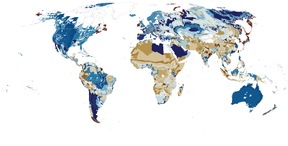Public defence in Water and Environmental Engineering, Venla Niva, M.Sc. (Tech.)

When
Where
Event language(s)
Over the recent years, human migration has risen to the top of the global agenda. Conflicts in the Middle East, Central America, Southeast Asia, and more recently in Europe have forced millions of people to flee. At the same time, hundreds of millions of people are moving from rural to urban areas as urbanization accelerates, especially in Africa and Southeast Asia. While conflict is perhaps the most tragic driver of human mobility, migration is also driven by the interplay of multiple socio-economic and environmental factors that is behind not only the decision to move but also behind outcomes of migration at the destination. While there is conceptual clarity of the different drivers and outcomes of migration and their interplay, their geospatial, global and integrative representations are few.
Thus, this dissertation addresses this gap by providing a global synthesis on the development and implications of human migration in different geospatial units, and on the key drivers and their interplay behind migration, at both sending and receiving areas. The analysis takes an integrative approach by combining qualitative conceptualization with quantitative analysis which make use of spatial, exploratory and statistical methods, and spatially explicit, novel data. The dissertation highlights the importance of high-resolution data and analysis by showing that the patterns of migration vary remarkably depending on the geospatial unit and scale. For instance, urban areas dominate as migration destinations at the global level, while the pattern becomes patchier at regional, national and sub-national levels, where rural areas have also experienced notable in-migration. This dissertation emphasises the importance of integrating different factors and levels of human capacity into the analysis of human migration in the context of environmental change. Over the past three decades, the majority of migration has taken place in areas with medium-level human development and environmental stress. Considering the social dimension of migration is especially important in vulnerable areas.
In a future facing unprecedented and unforeseen change, migration will continue to function as one of the methods of adaptation. Integrative approaches provide a mean for better understanding of the complexities and causalities behind human migration and its environmental and social dimensions. This will be key in sustainable and just management of human migration.
Opponent: Professor Robert McLeman, Wilfrid Laurier University, Waterloo, Ontario, Canada
Custos: Distinguished Professor Olli Varis, Aalto University School of Engineering, Department of Built Environment
Contact information of the doctoral student: Venla Niva, venla.niva@aalto.fi
The public defence will be organised on campus (auditorium M1, Otakaari 1) and online via Zoom https://aalto.zoom.us/j/66787980992.
The thesis is publicly displayed 10 days before the defence in the publication archive Aaltodoc of Aalto University.






